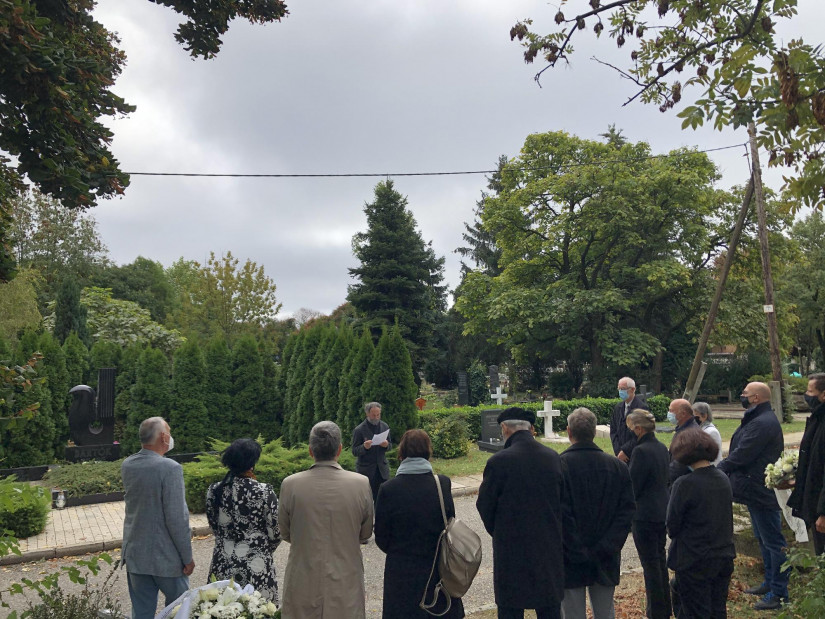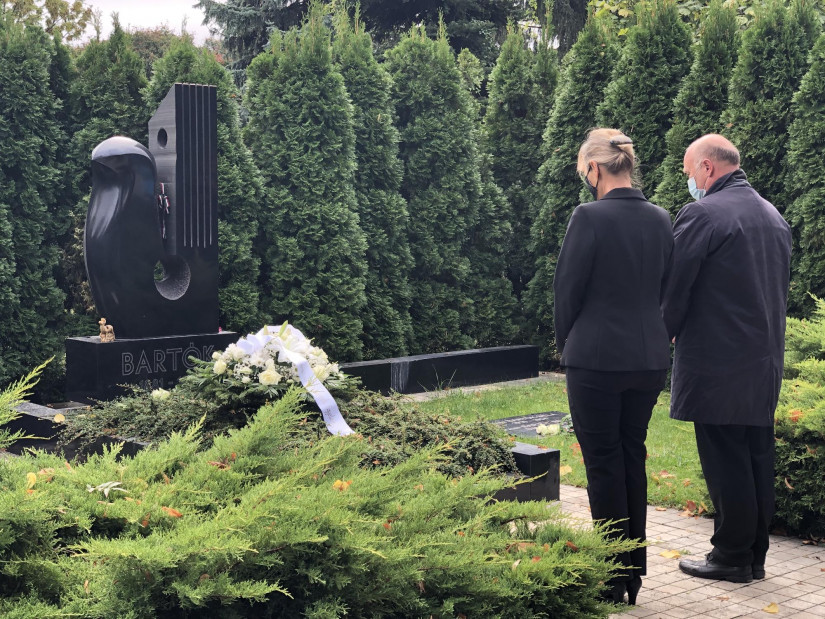Commemoration honouring Béla Bartók, who passed away 75 years ago, held in the Farkasréti cemetery
Dr. Andrea Vigh, Rector of the Liszt Academy, Dr. Pál Richter, head of the Department of Folk Music at the university and the director of the Institute of Musicology, and Balázs Kocsár, chief music director at the State Opera House attended the joint wreath-laying ceremony.
“His works, which draw so much from folk art, celebrate life and make it worth living to this day. With his explorations of the past, on which Bartók embarked in his lifetime, he did not primarily want to serve the past, but rather the future. His work as a composer reflects best his inquisitive and investigative spirit. The fact that he was working for the future is truly evidenced by the number and weight of the pedagogical works prepared for future generations in the composer's oeuvre, as well as his artistic faith and value, which have not been worn to this day,” emphasized Dr. László Vikárius, lecturer at the Liszt Ferenc University of Music and head of the Bartók Archives at the ELKH BTK Institute of Musicology.

The heads of the Ferenc Liszt University of Music, the ELKH BTK Institute of Musicology and the Hungarian State Opera House, as well as their invited guests, commemorated the 75th anniversary together.

Dr. Andrea Vigh, Rector of the Liszt Academy, Dr. Pál Richter, head of the Department of Folk Music
Below is the full text of Dr. László Vikárius's speech, delivered on this occasion.
This time - in Bartók’s memory - allow me to recall the artist’s most memorable - almost legendary - farewell words: "My greatest regret is that I have to leave with a full suitcase." His son, Péter, writes in his book that he had heard these words from Henrik Lax, one of Bartók's doctors, who was one of the composer's last visitors during his final days in the hospital. It is thanks to him that this captivating farewell became known to the world and was included in Bartók's biography. Henry Lax's recollection, sent to Ferenc Bónis, is even more detailed, as Lax recalls the following: "If only you knew how heavy the suitcase that I’m taking with me is, how much more there is to be written in it."
There is no doubt that much remained unfinished with Bartók’s passing. He could have finished the score of the Piano Concerto No. 3, which was missing only a few bars of the instrumentation and the recording of the instructions for the performers. He could have written out (or rather written) the Viola Concerto, which he left as a sketch. He could have corrected the score of the orchestral Concerto, which was still to be published and which had represented such an important turning point in the American period. The manuscript of the Solo Sonata for Violin - written to Yehudi Menuhin -, which is both a summary and a harbinger of so many new musical ideas, was also waiting to be finalised. He could have composed the String Quartet No. 7, which he had been planning to do. Moreover, he could have seen the publication of his carefully prepared scholarly work, the Turkish collection, the great Romanian collection, and of his notes - accompanied by an analytical study - based on the Milman Parry Serbian-Croatian collection. He could also have witnessed the publication of the extensive Hungarian folk song categorisation that he had left at home at the Hungarian Academy of Sciences. Naturally, we can’t possibly know what else, beyond all the above, he had in mind. It is obvious that even upon his death, Bartók was thinking about possibilities, and he was looking ahead. Typically, in one of his Harvard lectures in 1943, he remarked: "I myself would still prefer to look for new ways and means today than to formulate theories."
At first glance, it may seem he was researching the past as a scientist. After all, in his scientific work he examined what could be grasped in the present in order to explore some features, pieces and connections of the distant past. His works, which draw so much from folk art, celebrate life and make it worth living to this day. The fact that he was working for the future is best demonstrated by the number and weight of pedagogical works prepared for future generations in the composer's oeuvre, as well as his artistic faith and value, which have not been worn to this day. He undoubtedly took away with him a lot of important and beautiful things in that full suitcase. Yet, what he left behind in incomparably weightier.
Even if 7th string quartet was never born, all of his works put to paper up until that point – some of them unfinished - came to life. His scientific studies on folk music – so hopelessly set aside at the time - have also been published, one after another, and they still provide an omnipresent, solid foundation for further research. His legacy is present, and even today offers a wealth of inspiration for performing arts, music theory and analysis, and of course to the publishers of his works.
Perhaps it is not entirely unreasonable to remember the other heavy package - several suitcases - that for a while seemed to have been lost following Bartók's arrival in America, but then was found. It is hard to imagine the feverish preparation that his US trip in 1940 must have entailed: organizing the transport of manuscripts starting from the spring of 1938, following the Anschluss, the writing and publishing of the last European compositions, while trying to salvage his works by transferring them from his Viennese publisher to English publishers Boosey & Hawkes. As early as October 9, 1938, he wrote a letter to Annie Mueller-Widmann in which he gave an insightful assessment of Nazism's "influence […] on the system of lies," about his own work as a composer and his task in the field of folk music science. “… as far as I’m concerned, I worked hard in the summer: I finished the Violin Concerto and wrote (to order) two pieces for Szigeti and the American jazz clarinettist Benny Goodman [...] I live here in even more reclusion – if that is at all possible -, I don’t feel like meeting people, everyone alive could be a Nazi. I work 10 hours almost every day, focusing exclusively on folk music material; but I would have to work 20 hours to make some progress. This is a delicate situation - I would like to finish this work before the global catastrophe that is hanging in the air strikes.”His last year in Europe had indeed been spent with feverish work, as he wanted to finish and put everything in order. Moreover, he even made sure to give a farewell concert in Budapest with his wife on October 8 at the Academy of Music, which was the key venue of his entire piano career.
On November 3, his Sonata for Two Pianos and Percussion debuted at the Town Hall in New York. Following a vicissitudinous journey, they arrived just in time to have a rehearsal with the percussionists, for whom the task was rather unusual. To top the excitement of the journey, their luggage had been lost. In November, Bartók wrote to his son Béla: “Our six suitcases weighing 310-pounds are to be considered lost. [...]I can't really write any good news about ourselves. We have to get clothes, sheet music; we have lost everything. It is all very depressing”. The luggage also contained the manuscripts of Bartók's folk music work; their loss would have been truly fatal. Three months later, however, he was finally able to relay the unexpected good news to his son: “they found the luggage [...] Everything is there, uneaten by moths, safe from theft. Well, we managed this one as well.”
Bartók passed away 75 years ago, far from his homeland, in New York. Today, we remember him here, just as we celebrate his birthday here every year. In 1988, not coincidentally at the dawn of the regime change, his sons had his earthly remains transported here, to the Farkasréti Cemetery, from his grave in New York. And they have preserved - partly in America and partly at home – his heritage consisting of many, many packages of manuscripts, which can be studied today in the Bartók research centres in Basel and Budapest. Is it an exaggeration to feel that that particular “full suitcase” is not completely lost either? After all, artists and scientists - even during a pandemic – are working to keep everything that is left to us alive - in a form that is“uneaten by moths, safe from theft”.
László Vikárius


